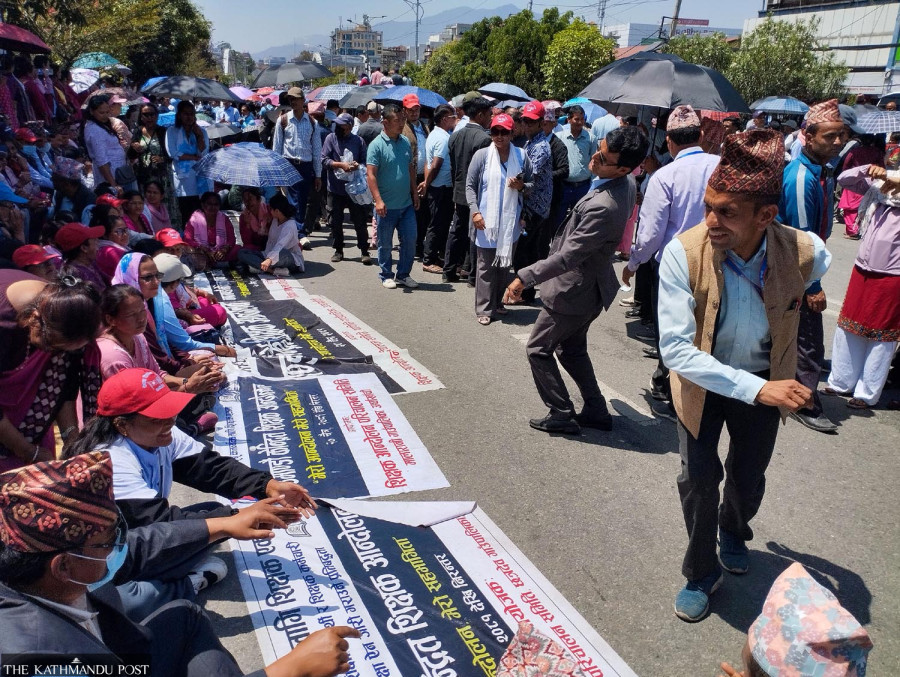National
Government and teachers still at odds over education bill
Talks have failed to bring any positive results although bill endorsement deadline looms.
Binod Ghimire
On May 25, Education Minister Raghuji Pant sought a week from the Education, Health and Information Technology Committee of the House of Representatives to consult with teachers before finalising the government’s position on the School Education Bill.
He had said the ministry was already in talks with the dissenting teachers and would come up with some conclusions in a week. However, though the House panel has been summoned on Monday to discuss the bill, the government and the teachers have yet to reach a meeting point.
Nanu Maya Parajuli, vice-chairperson of the Nepal Teachers’ Federation, said that though they have held three rounds of meetings with the education ministry officials, there has been no agreement. “We have regularly been sitting with the ministry officials to discuss the provisions that need to be included in the bill,” she said. “There has not been any significant process yet.”
After around two months of deliberation, a subpanel under the House committee submitted a report last week resolving most of the contentious provisions in the bill. It had found meeting points on most issues although the bill had received 1,758 amendments from 161 ruling and opposition party lawmakers. Several of these amendments were mutually conflicting.
However, the federation expressed serious reservations about the report, calling it more regressive than the original bill. It said the revised bill did not include the agreements reached with the federation in the past. It has been demanding permanent status for temporary teachers [including relief quota teachers, temporary contract teachers, teachers from former lower secondary schools, learning grant teachers, technical stream, and special education] through internal competition based on past agreements.
The bill finalised by the subpanel envisions internal competition for 60 percent of the positions, with the remaining 40 percent vacancies to be filled through open competition. The federation has also expressed dissatisfaction with the minimum service requirement for automatic promotion, as the bill states teachers must serve at least seven years to qualify.
The federation also seriously objects to the clause placing school teachers under the jurisdiction of local governments. In line with the Constitution of Nepal, the panel agreed that teachers would work under local governments, but it allows for one-time transfers between and within local units and provinces.
The teachers’ body urged the Education Committee to revise the bill to address their concerns.
Creating permanent positions for Early Childhood Development facilitators is another of their demands. They have also sought medical treatment for teachers and school staff at the Civil Service Hospital in Kathmandu at subsidised rates and payment of accumulated leaves in a lump sum upon retirement of all temporary teaching and school staff.
Adjustment of the salaries of ECD facilitators and non-teaching school staff, providing rural allowances to temporary teachers and staff, revision to the education regulations to include teachers and staff—currently paid with internal resources of community schools—in the contributory Social Security Fund are the other demands. The government has addressed some of the demands through the national budget.
However, the government is reluctant to commit to implementing the demands that require massive state funding. “The government has not agreed on internal competition for all kinds of temporary teachers and creating permanent positions for the ECD facilitators,” said Parajuli.
Appearing before the House committee last week, Pant had said the government was not economically and financially strong to execute earlier agreements that would create a burden on the state coffers. Creating new positions for the ECD facilitators and making temporary teachers permanent would cost billions of rupees.
Even as negotiations are ongoing to incorporate teachers’ demands, the House committee is also struggling to find consensus among parties on how to regulate private schools. While there is unanimity that private schools cannot be left to be commercial, there are differences over how best to regulate them. There is a strong view that all private schools should be converted into trusts allowing them some years for preparations, not all have agreed.
Finding agreement in the bill earliest possible is necessary as ruling parties have made a written commitment to teachers that the bill will be endorsed by the lower house by June 29.




 10.12°C Kathmandu
10.12°C Kathmandu















